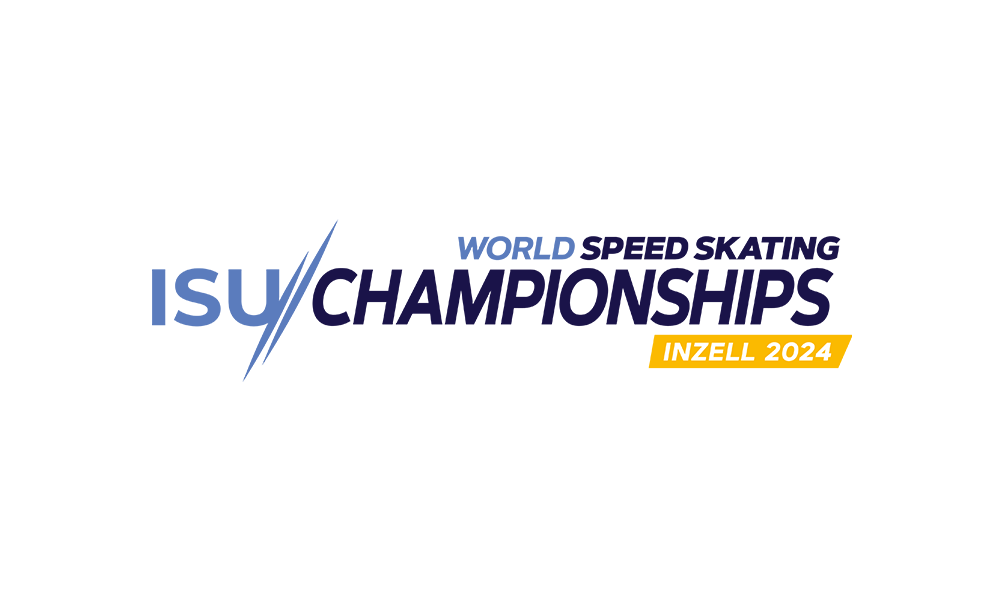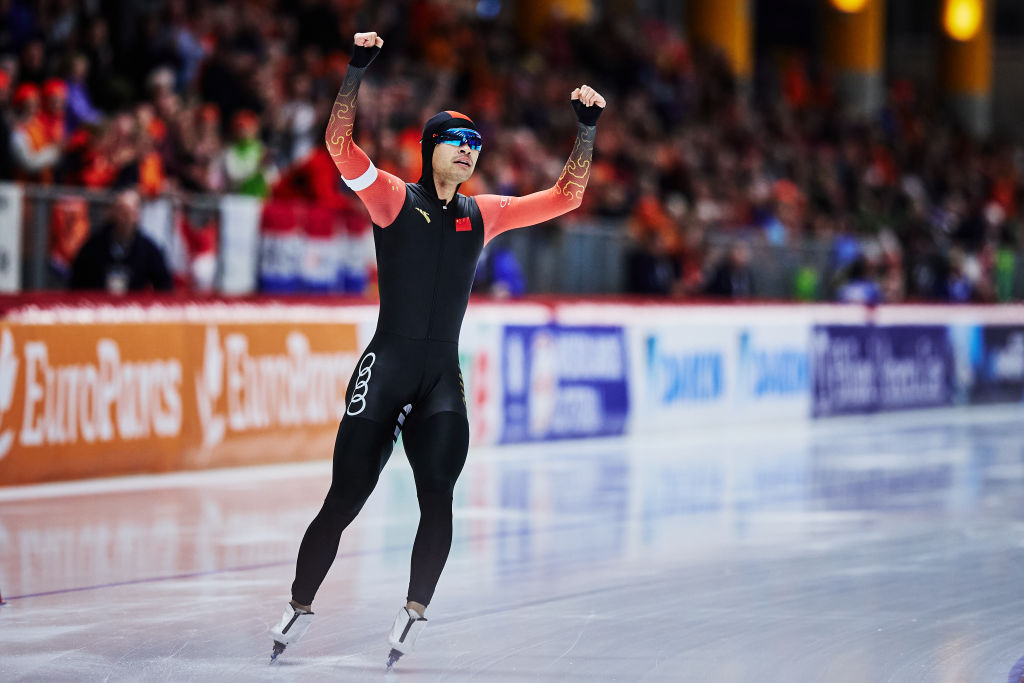
Zhongyan Ning (CHN) celebrates at the ISU World Speed Skating Sprint Championships in Inzell, Germany © ISU
In a tight battle over four exciting distances, Ning Zhongyan (CHN) crowned himself the first Chinese male World Sprint Champion in the history of speed skating. Laurent Dubeuil (CAN) went into the second day as leader in the ranking, Jenning de Boo (NED) pushed him off the top spot with a superb 500m, but Ning dealt the decisive blow with a track record time of 1:07.11 in the final 1000m. De Boo had to settle for silver and Dubreuil for bronze.
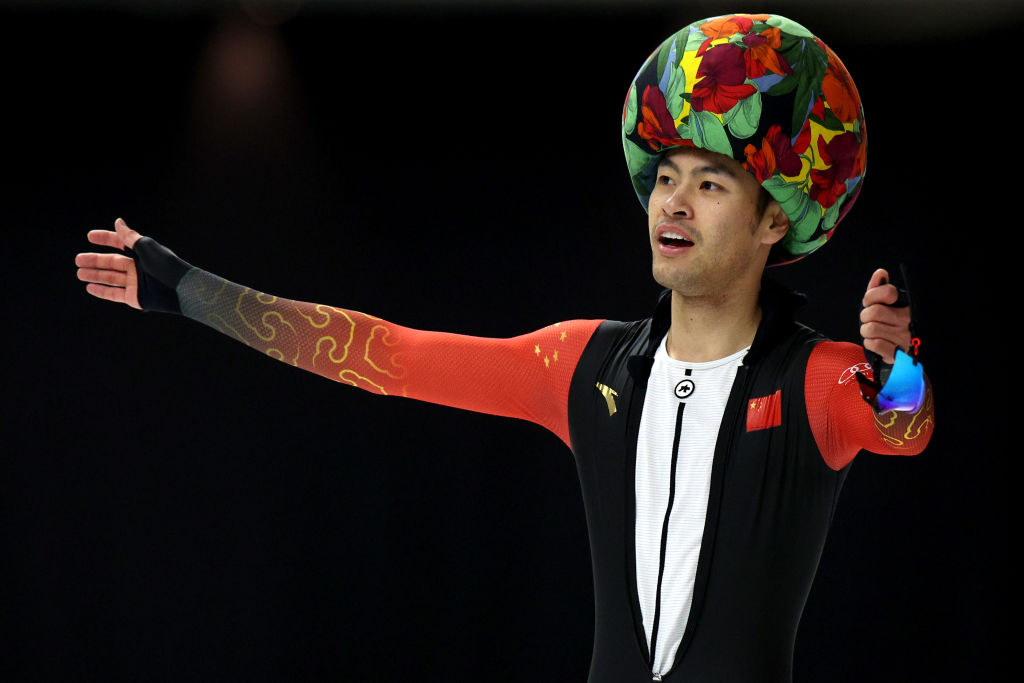
Zhongyan Ning (CHN) at the ISU World Speed Skating Sprint Championships in Inzell, Germany © ISU
‘Super good 500m’ for De Boo
After the first day Jenning de Boo (NED) said that he needed a better 500m on Friday to be able to fight for the title, and that’s exactly what he did. After his third place in 34.65s on Thursday, the Dutch youngster hammered out a time of 34.27s to win the second 500m of the championships.
“I skated a super good 500m today, I’m very proud of that,” De Boo said.
The Dutchman overtook Laurent Dubreuil (CAN) on top of the ranking after three distances. The Canadian 500m specialist equaled his first 500m time in 34.47 to finish joint second with Ning Zhongyan (CHN) in the distance on Friday.
The top three was very tight with De Boo defending a .07s gap over Dubreuil in the final 1000m, and Ning trailing Dubreuil by just .06s.
The gap behind Ning was massive. Trailing Ning by 1.31s, the podium was out of sight for fourth ranked Marek Kania (POL).
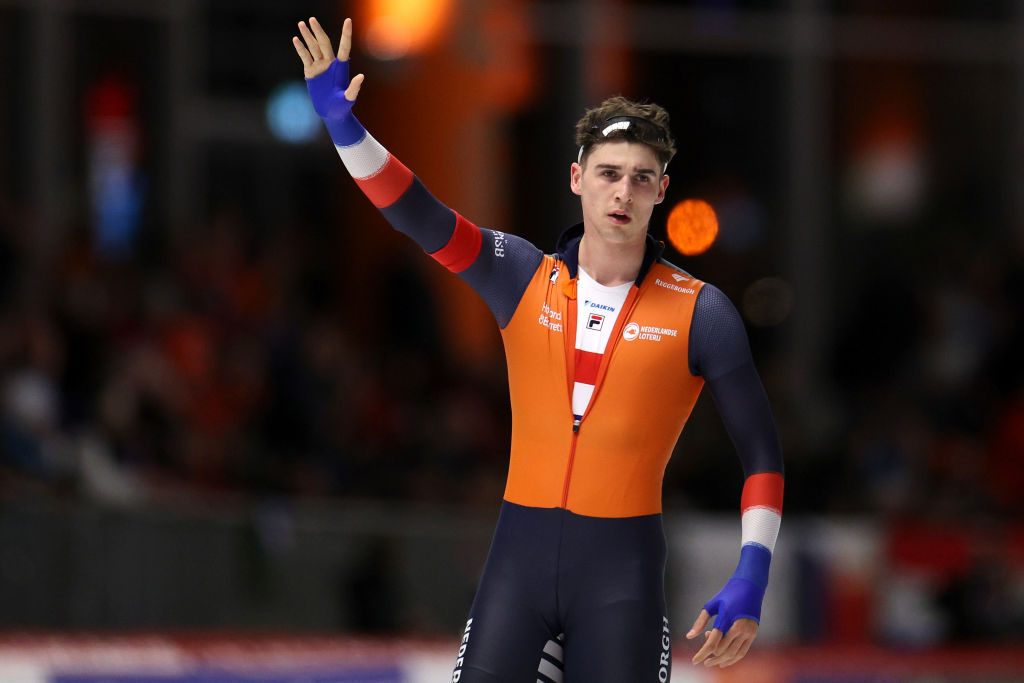
Jenning de Boo (NED) in the Men's Sprint 2nd 500m in Inzell, Germany © ISU
Track record seals gold for Ning
In the 1000m, Ning started in the inner lane versus fifth ranked Kjeld Nuis (NED) in the penultimate pairing.
The Dutch bronze medal-winner of the World Single Distance championships was the perfect bait for Ning to chase on the final back stretch. Coming from the outer corner, Ning reeled in Nuis before entering the final inner corner to finish .54s ahead of the Dutchman.
Looking at Ning’s 1:07.11 in the 1000m, Dubreuil already knew that he didn’t have much of a chance to win the world title, but his opponent in the final pairing, De Boo, had not thrown in the towel just yet.
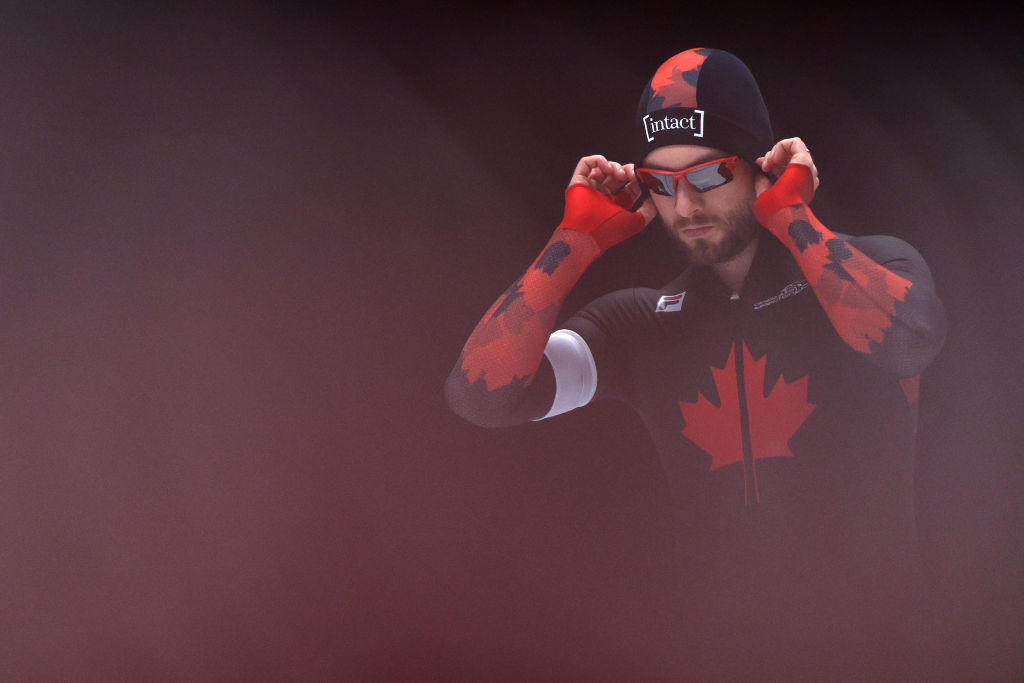
Laurent Dubreuil (CAN) in the Men's Sprint 2nd 500m in Inzell, Germany © ISU
Dubreuil said: “Ning had a really, really good 500m. I probably needed to beat them by two tenths (to be able to hold him off for the title in the 1000m) but instead he almost beat me.”
De Boo commented: "I thought I had a chance to win the title. I was ranked first and I’ve skated a super fast 1000m before, but this was the end of a tough weekend, the end of a long season and the energy slowly faded away, whereas he (Ning) was able to give a little extra one more time."
De Boo stopped the clock at 1:07.98 for ninth place in the final 1000m and second in the overall classification.
“I have to be content. I make my (World Sprint Championships) debut with a silver medal, so that’s promising for the future,” the 20-year-old Dutchman said.
Dubreuil concluded: “I was hoping to have more energy, but that's where the two weeks of no training, because I was sick, really hurts.
“In the 500m my energy was OK, I just didn't have a good execution. My first few steps were not as good as I wanted and then it was a 9.6s (opener) instead of 9.5, and then I was slipping at the exit of the first corner. The time was the same as yesterday, but the ice is definitely faster today.
“In the 1000m I was just too tired. I did not have the energy anymore.”
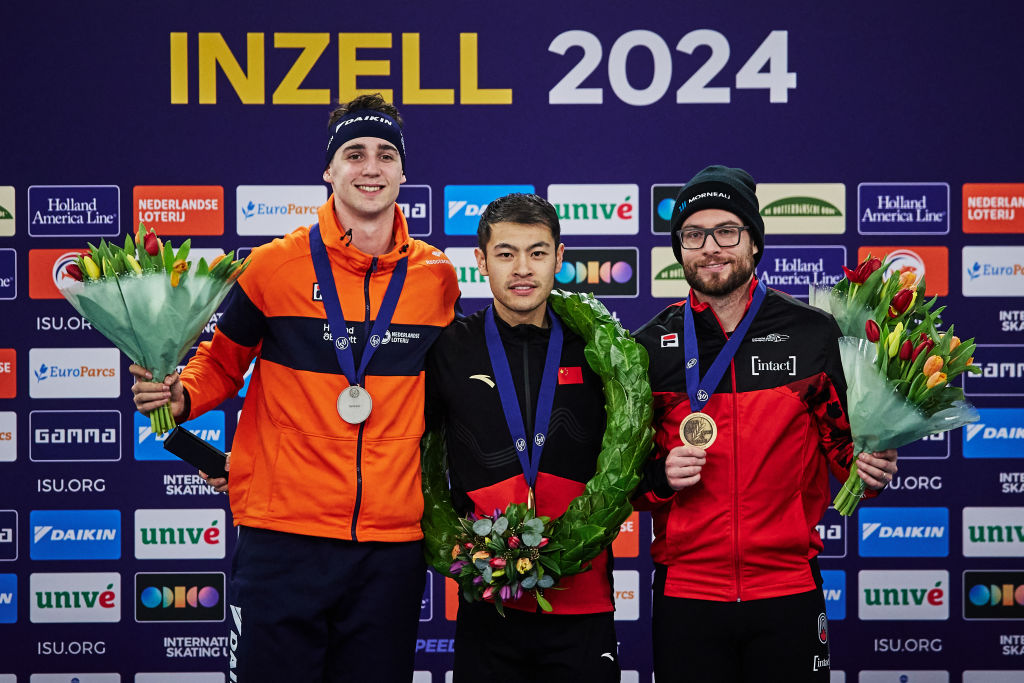
(L-R) Medalists Jenning De Boo (NED), Zhongyan Ning (CHN) and Laurent Dubreuil (CAN) in Inzell, Germany © ISU
Champion Ning couldn’t believe what he had just done when he saw his name on top of the ranking after four distances. Having won 1000m and 1500m silver medals at the World Single Distance Championships in Calgary in February, Ning considered himself more of a middle distance specialist than a sprinter.
Skating two personal bests however, in the shortest distance on Thursday and Friday, eventually laid the groundwork for his title.
“I didn’t think I could win the World Sprint Championships. My personal best in the 500m was so high, but eventually I could win. To skate a (1000m) track record… it’s amazing.”
“Normally I’m not focused on the 500m, but only on the 1000m and the 1500m. Only after the World Single Distance Championships (in Calgary last February) I could focus on the sprint tournament.”
Junior World record
At 1.505 points from winner Ning, Koo Kyung-Min (KOR) skated a Junior World Record in the sprint combination for a total of 138.185 points in tenth place. The 19-year-old Korean was 1.565 points faster than the previous World Junior Record in the sprint combination set by Beorn Nijenhuis in Salt Lake City in 2003.
Speed Skating tradition
Although the single distance format tends to get more attention because it’s Olympic style, the long track Speed Skating championships were traditionally decided by racing multiple distance tournaments. The first ISU World Allround Speed Skating Championships were held in 1893, when Jaap Eden (NED) took the title in Amsterdam (NED). The first World Single Distances Championships were held over a century later in Hamar (NOR) in 1996.
In the traditional Allround format skaters a classification is made up after four distances. Men skate the 500m and the 5000m on the first day and the 1500m and the 10,000m on the second. The women’s distances are 500m, 3000m, 1500m and 5000m.
The World Sprint Championships were first held in 1970. In this format both the men and the women skate the 500m and the 1000m twice.
In Inzell (GER), the Sprint Championships are held on Thursday and Friday, and the Allround Championships are scheduled for Saturday and Sunday.
Samalog score
In both the Sprint and the Allround tournaments the final ranking is based on the so-called samalog score over four distances. The samalog system converts times into points, with the 500m as starting point. For a 500m race, the number of seconds counts as the number of points. For the 1000m the number of seconds is divided by two to calculate the number of points; for the 1500m it’s divided by three, for the 3000m by six, for the 5000m by 10 and for the 10,000m by 20.
Program:
Thursday 7 March 2024
19:00 - 1st 500m Women
19:00 - 1st 500m Men
19:00 - 1st 1000m Women
19:00 - 1st 1000m Men
Friday 8 March 2024
18:30 - 2nd 500m Women
18:30 - 2nd 500m Men
18:30 - 2nd 1000m Women
18:30 - 2nd 1000m Men
Saturday 9 March 2024
12:45 - 500m Women
12:45 - 500m Men
12:45 - 3000m Women
12:45 - 5000m Men
Sunday 10 March 2024
13:15 - 1500m Women
13:15 - 1500m Men
13:15 - 5000m Women
13:15 - 10000m Men
